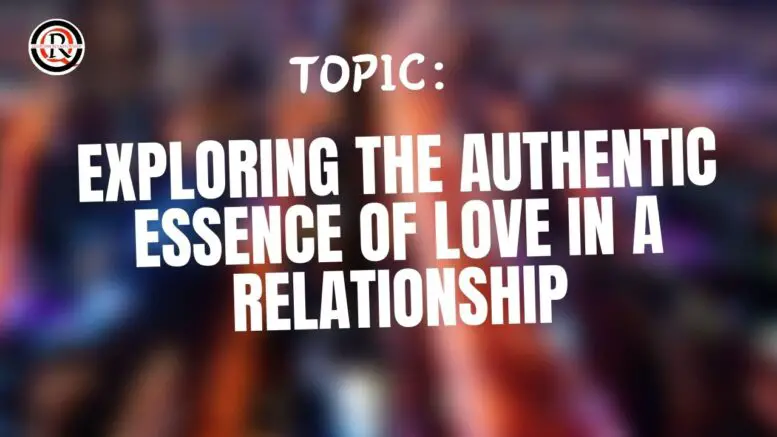Exploring the Authentic Essence of Love in a Relationship
Since love may take on so many different shapes and forms, it is impossible to pin down what exactly love looks like in a relationship. In relationships, figuring out what love really means can be difficult and heavily dependent on the particular dynamics and feelings that each partner brings to the table.
A couple’s love is characterized by deep feelings and romantic or sexual attraction, although these features barely begin to capture the intricacy of this bond. A couple’s undying love is defined as their undying emotional and mental ties in addition to their physical attraction to one another. But love is an extremely unique and subjective feeling because of its complexity.
Breaking down the multifaceted nature of love reveals four principal types, each with its own significance:
- Eros: Romantic love
- Philia: Familial love (friendly)
- Storage: Familial love (affectionate)
- Agape: Unconditional love
Identifying signs of true love within a relationship involves recognizing nuanced behaviors that may vary from one connection to another. Some indicative signs include:
- Patience and Understanding: Demonstrating patience and understanding despite differences.
- Open Communication: Establishing honest and non-judgmental communication between partners.
- Trust: Building a foundation of trust without doubts or insecurities.
- Authenticity: Creating an environment where both individuals feel free to be themselves, quirks and all.
The timeline for when love develops in a relationship is unpredictable, emphasizing the importance of patience. Whether instantaneous or evolving over years, the emergence of love remains a subjective experience.
Determining if a partner truly loves you involves recognizing consistent signs such as implicit trust, a desire to spend quality time together, inclusion in significant decisions, genuine interest in each other’s daily lives, and the demonstration of unrestricted respect. Making each other a priority further solidifies the presence of genuine love.
Defining love within a relationship is an ongoing pursuit, engaging philosophers and poets alike. Love’s core essence involves a profound affection and emotional connection with another individual. Despite the inherent challenge in providing a comprehensive answer, reflecting on these thoughts and concepts surrounding the definition of love may offer valuable insights, bringing us closer to understanding this intricate and deeply personal experience.
5 Different Ways to Show Love and Improve Your Relationship
1. Expressive Communication:
Verbal Affirmations: Regularly express your love through verbal affirmations. Simple statements like “I love you,” “You mean a lot to me,” or specific compliments can reinforce your emotional connection.
Active Listening: Demonstrate your love by actively listening to your partner. Give them your full attention, validate their feelings, and engage in open and empathetic communication.
2. Acts of Kindness:
Surprises and Thoughtful Gestures: Surprise your partner with small, thoughtful gestures or surprises that show you know and appreciate their preferences. This could be as simple as preparing their favorite meal, leaving a heartfelt note, or planning a surprise outing.
Acts of Service: Help alleviate your partner’s burdens by offering acts of service. This could include assisting with household chores, running errands, or taking on tasks to lighten their load.
3. Quality Time:
Uninterrupted Quality Time: Dedicate quality time to your partner without distractions. This could involve engaging in shared activities, having meaningful conversations, or simply enjoying each other’s company.
Date Nights: Plan regular date nights to create special moments together. Whether it’s a romantic dinner, a movie night, or an adventurous outing, these moments strengthen your bond.
4. Physical Affection:
Intimate Moments: Physical touch is a powerful way to express love. Whether through hugs, kisses, or other forms of intimacy, physical affection fosters a sense of closeness and connection.
Non-Sexual Touch:
Simple gestures like holding hands, cuddling, or offering a comforting touch communicate love and emotional support.
Support and Encouragement:
Encourage Personal Growth: Show love by supporting your partner’s personal and professional aspirations. Encourage their goals, provide constructive feedback, and celebrate their achievements.
Emotional Support: During challenging times, offer emotional support. Be a reliable and empathetic presence, actively listen to their concerns, and reassure them of your unwavering support.
By incorporating these various ways of showing love into your relationship, you can strengthen the emotional connection and create a more fulfilling and supportive partnership. It’s important to tailor these expressions of love to your partner’s preferences and to maintain consistency in your efforts to nurture the relationship.
6 Types of Relationships and Their Effect on Your Life
Family Relationships:
Effect: Family relationships, such as those with parents, siblings, and extended family, have a profound and long-lasting impact on one’s life. They shape early beliefs, values, and behaviors, influencing personal identity and emotional well-being.
Romantic Relationships:
- Effect:
Romantic relationships play a crucial role in emotional and social development. They can provide love, companionship, and support. Healthy romantic relationships contribute to happiness and fulfillment, while toxic ones may lead to stress and emotional turmoil.
Friendships:
Effect: Friendships contribute to social well-being, providing companionship, shared experiences, and emotional support. Positive friendships enhance mental health, while negative or toxic friendships can lead to stress and negatively impact self-esteem.
Professional Relationships:
Effect: Relationships in the workplace influence career satisfaction and success. Positive professional relationships contribute to a supportive work environment, collaboration, and career advancement. Negative relationships may lead to stress and job dissatisfaction.
Casual or Acquaintance Relationships:
Effect: Casual relationships with acquaintances or people in your community can contribute to a sense of belonging. While not as intimate as other types, these relationships can offer support, networking opportunities, and a broader social connection.
Online or Virtual Relationships:
Effect: With the rise of technology, online relationships have become prevalent. These can range from friendships and romantic connections to professional collaborations. While they provide virtual support and connections, the impact on well-being may vary, and face-to-face interactions remain crucial for a holistic social experience.
It’s important to note that the quality of relationships matters more than the quantity. Positive relationships generally contribute to happiness, emotional well-being, and personal growth, while negative or toxic relationships can have detrimental effects on mental and emotional health. Balancing and nurturing different types of relationships is essential for a well-rounded and fulfilling life.
What True Love Means, According To A Therapist
True love is a complex and multifaceted concept, and therapists often provide insights into its meaning based on their professional experience. While interpretations may vary, many therapists emphasize certain key aspects when defining true love:
Unconditional Acceptance:
True love involves accepting your partner for who they are, flaws and all. Therapists often emphasize the importance of unconditional acceptance, where individuals feel loved and valued regardless of their imperfections.
Emotional Safety:
True love creates a safe and secure emotional environment. Therapists highlight the significance of feeling emotionally safe to express oneself, share vulnerabilities, and be open without fear of judgment
Effective Communication:
Therapists stress the role of effective communication in true love. This includes active listening, open dialogue, and the ability to express feelings and needs honestly. Communication forms the foundation for understanding and connection.
Mutual Growth and Support:
True love involves mutual support for personal growth. Therapists often highlight relationships where partners encourage each other’s development, share common goals, and provide emotional support during life’s challenges
Respect and Empathy:
Respect and empathy are fundamental components of true love. Therapists emphasize the importance of respecting each other’s boundaries, understanding differing perspectives, and showing empathy towards your partner’s experiences.
Commitment and Partnership:
True love entails a commitment to the relationship and a sense of partnership. Therapists stress the idea that both individuals actively contribute to the relationship’s well-being, working together through highs and lows.
Intimacy Beyond Physical:
Therapists often point out that true love involves a deep emotional and spiritual intimacy beyond the physical realm. While physical intimacy is important, emotional connection and shared values contribute significantly to the depth of true love.
Shared Values and Goals:
True love often aligns with shared values and goals. Therapists emphasize the importance of compatibility in areas such as core beliefs, life aspirations, and fundamental values to create a strong foundation for the relationship.
It’s crucial to recognize that true love is a subjective experience, and individuals may have different interpretations based on their cultural, personal, and relational contexts. Therapists often guide individuals and couples toward building healthy, fulfilling relationships by focusing on these core elements of true love.






Be the first to comment on "Exploring the Authentic Essence of Love in a Relationship"